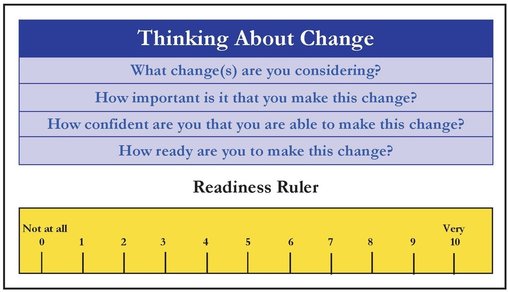Habits are hard to break. Especially the ones that harm us.
Then why do we smoke, drink, gamble, steal, lie, cheat, use words as weapons, or indulge in other high risk behaviors that hurt others and/or ourselves? Is it the illusion of comfort, connection, or immunity to chaos?
As a physician, parent, partner, meditation/writing teacher, and friend, it is a privilege to guide others through subconscious forests. Which paths will offer insight and lead to meaningful healing? When the path is narrow, am I leading them or are they guiding me? What would it mean to walk side by side when the path widens again?
Sometimes I’ll use a motivational interviewing technique and ask their willingness to change a behavior on a scale of 1 to 10. I’ll also use the same ruler to gauge their confidence in making this change, discussing why the number is high or low in each circumstance. We’ll explore the reasons why they want to make the change and the barriers in their way.
For fun (and maybe to cultivate more humility), I decided to apply this technique to a behavior I wanted to change: cutting down on sugar and caffeine. On a motivation scale, I was at a 9. My reasons for cutting down on both were to experience less anxiety, heartburn, and inflammation, feel better, and have more energy directed towards the people and things I care about. On a confidence scale I was closer to a 7 and less certain. Barriers to implementing this change included family members loving sweets (having sweets in the house), enjoying the taste of certain desserts (especially chocolate and coffee), and using sweets as stress relievers.
The motivational interviewing readiness ruler is quite useful in examining habits, but something crucial is missing. The evaluation feels a little too cerebral, as if I’m guiding others and myself with a GPS unit that only knows one way. What if we get lost on the hike and the trails are unmarked? What can we count on to direct us?
In my blog posts, you’ll notice I keep coming back to the heart. Perhaps the most important question is not how motivated or confident we are in changing a habit, or even what the barriers are. What if the most important question is, “What is the need beneath the want”? What is the need beneath smoking, drinking, gambling, stealing, lying, cheating, aggression, and high risk sexual behaviors? Do we even stop long enough to ask each other this question?
Maybe the deeper need is for safety, kindness, connection, understanding, or peace. Maybe it’s a little bit of each one. As I ask this question, I sense my true need for sweets is a yearning for the sweetness life offers through authentic connections with others and myself. But I can’t know this need without feeling the pain of separation first.
Certain habits feel good, but they disconnect us from our deepest longing. Our fear of falling into the abyss of that longing hardens our habits. If you are earnestly trying to change a harmful behavior affecting you or someone you love, may this post inspire you to ask tough questions. May you sense the need beneath the want and have the support to explore your wild heart with an affirming companion.


 RSS Feed
RSS Feed